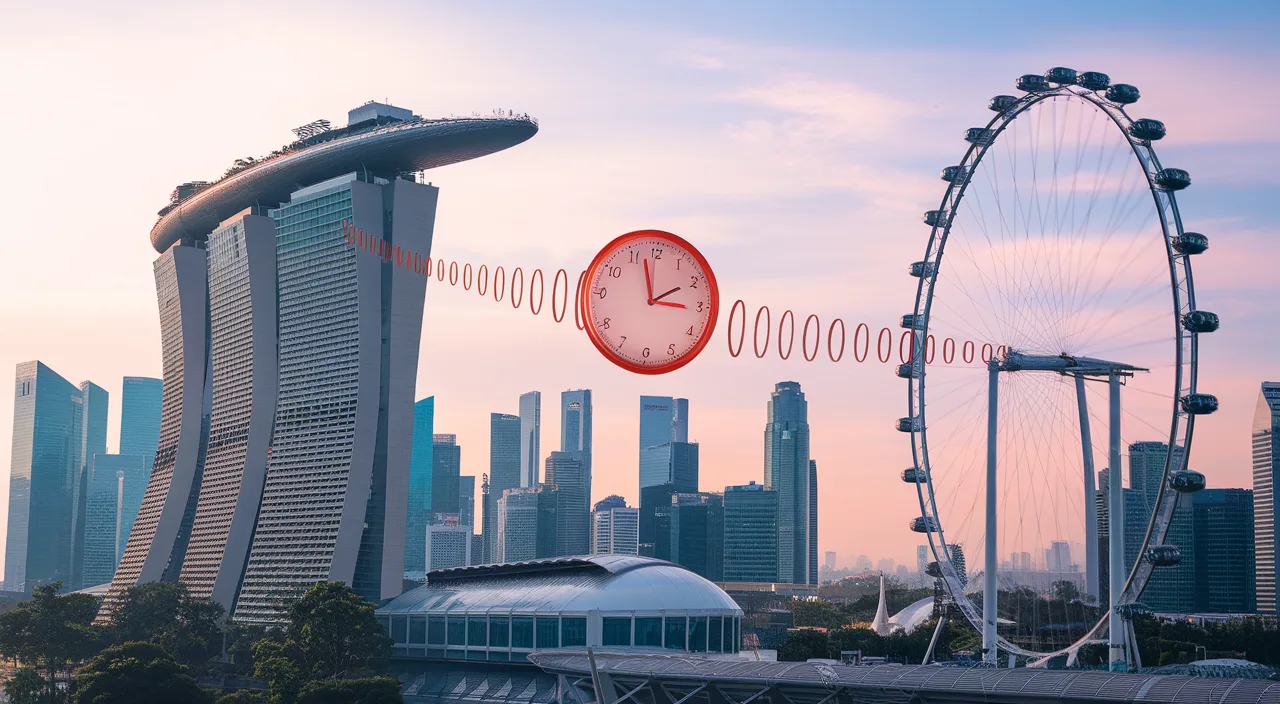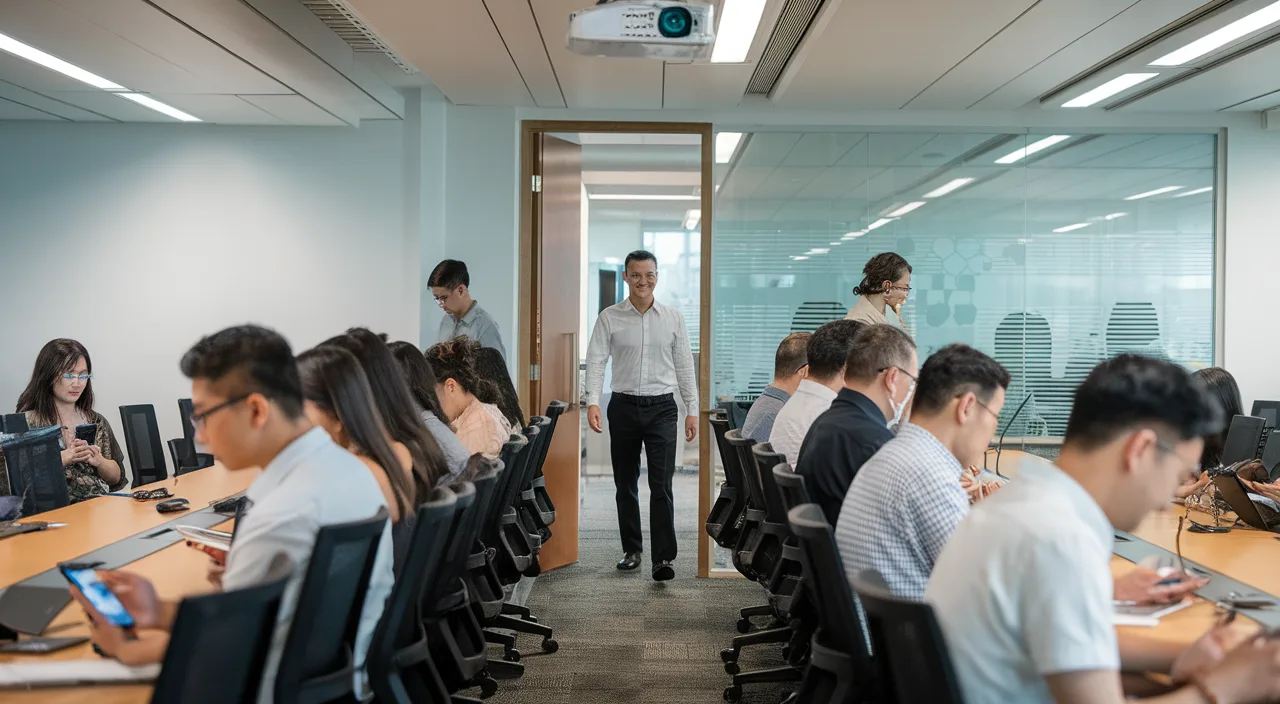What does ‘rubber time’ mean in Singapore?
Short answer? ‘Rubber time’ in Singlish refers to the incredibly stretchy concept of time — informal, flexible, and suspiciously convenient when someone is late. You can think of it as the friendly (or sometimes annoying) way of saying: “Don’t worry lah, timing flexible one.”
TL;DR Summary
- ‘Rubber time’ means being late or extending time in a casual, unbothered manner.
- It’s a Singlish slang rooted in local culture — super common in social settings.
- Reflects a laidback, ‘relak lah’ attitude but can be jialat in professional contexts.
- Used with a smile among friends, but can cause tension if misused at work.
- Shows the importance of understanding context and boundaries in Singaporean expressions.
The Cultural Quirk of ‘Rubber Time’ in Singlish
Understanding the Origin of ‘Rubber Time’
Singapore may be a land of MRTs, ERP gantries, and minutes that matter — but don’t be surprised if your friend tells you they’re “on the way” while still brushing teeth at home. That’s the magic (and madness) of ‘rubber time’.
This Singaporean expression itself slips and slides through time like a worn-out rubber band. It’s believed to have originated from Southeast Asian cultural norms where time is viewed more fluidly. In Malaysian culture, there’s “jam karet” (literally “rubber hour”) and in the Philippines, they have their ‘Filipino time’. Singapore picked it up, Singlish-fied it, and made it uniquely local. Because if we’re going to be late, we’ll be late in our own way — with flavor.
In Singlish, it’s not always said directly as “rubber time.” Sometimes, it’s implied through phrases like:
-
Brand, hokkien, Parody, Romper, singlish, Typography
$25.00 Select options This product has multiple variants. The options may be chosen on the product page -
Food, KaoBeiKing, Parody, Singlish/Hokkien, T-shirts
Price range: $30.00 through $38.00 Select options This product has multiple variants. The options may be chosen on the product page
- “Eh, 8pm but can stretch lah, not so tight.”
- “Don’t worry, rubber time one.”
- “I come soon. You know me — rubber time.”
This uniquely informal style develops naturally in a multicultural society where punctuality is often negotiable — depending on the occasion and the people involved. Understanding Singaporean expressions like this reveals how time is not always linear in Singapore. Sometimes it’s bendy, like Play-Doh.
Why Do Singaporeans Use ‘Rubber Time’?
Ah, this one deep. On the surface, it seems like laziness or bad time management. But dig deeper, and you’ll find ‘rubber time’ represents multiple layers of cultural nuances in Singapore identity.
1. Casual Communal Culture
Singapore may be a modern city-state, but we grew up communal — family-style dinners, HDB corridors full of neighbours, kopi with auntie downstairs. Social gatherings often blur the line between scheduled and spontaneous. So being “on time” can sometimes feel too formal lor.
2. ‘No Need So Rigid Lah’ Mentality
Growing up here, many learn that unless it’s school or National Service, timing is open for interpretation. There’s a preference for chill vibes, marked by phrases like “can one” or “no rush.” That’s rubber time in action — a relaxed cultural default, especially in friend circles.
3. Power Play, Subconsciously
Sometimes, being late is a low-key flex. Think atas people who arrive fashionably late to remind you that their time “worth more”. Of course, they’ll never say it outright — but when a boss or senior friend shows up 30 minutes late, nobody dare to question. That’s unspoken rubber time power play in the wild.
4. Optimism Meets Reality Clash
Singaporeans are notorious for thinking they can do 10 things in one hour. “Can lah, just need 5 mins” — but then MRT delay, Mac delivery late, shoe spoil, blah blah. Suddenly, 1 hour become 1.5 hours, and they still say “I leave house already” (half-truth).
Real-Life Examples of ‘Rubber Time’ in Action
Every Singaporean has at least one story where rubber time became cause for eye-rolls or last-minute scrambling. Here are a few familiar types you’ve probably met (or been):
-
Chinese, Chinese New Year, KaoBeiKing, Quote, Singlish/Hokkien, T-shirts, Typography
Price range: $40.00 through $48.00 Select options This product has multiple variants. The options may be chosen on the product page -
Food, KaoBeiKing, Parody, Singlish/Hokkien, T-shirts, Typography
Price range: $30.00 through $38.00 Select options This product has multiple variants. The options may be chosen on the product page
The Birthday Rubber Band
You told everyone dinner at 7pm. The ones who arrived early are now bonding with the bartender, and it’s 8:05pm before the star of the night waltzes in with, “Wah early ah, I thought rubber time?”
The Kopitiam Delay
You jio your friend to meet for lunch at 1pm. 1:05pm — crickets. 1:15pm — WhatsApp blue tick. 1:30pm — “Sorry bro, overslept.” Cue eye twitch and stomach growl.
Work Meeting Shenanigans
This is where things get serious. In office culture, rubber time can backfire. If you show up late consistently, colleagues may view you as unprofessional — even if you’re technically part of a ‘relax lah’ culture.
Here’s what often happens in Singaporean workplaces:
- A team meeting starts at 2pm. HR and two execs log in punctually at 2.00pm sharp.
- Marketing waltzes in 2.15pm with bubble tea, claiming ‘traffic jam’
- Boss joins at 2.25pm and says “Let’s give 5 more mins for the rest.”
In theory, rubber time at work fosters leniency. In practice, it causes delay, annoyance, and silently sabotages productivity.
Implications of Rubber Time in Workplace Culture
Singaporeans often toggle between flexible social behaviours and strict professional expectations. Rubber time crosses that line when decoding Singlish slang meets corporate reality.
Here’s what to note if you want to protect your qiji (reputation):
- Not All Industries Tolerate It: Finance? Law? Medical? Better throw your rubber away.
- Late Once Can Pass: Bosses are human lah. But habitual lateness = can’t be trusted.
- It Reflects on Team Culture: A team stuck on rubber time may signal poor leadership or unclear expectations.
So yes, while Singlish lets us bend language to vibe with each other, timing is one area where bending too far becomes gila.
Embracing Cultural Differences: The Beauty of ‘Rubber Time’
Let’s not be too fast to condemn rubber time. It’s got its downsides, but also speaks volumes about our understanding of community rhythm — waiting for a late friend because they “sure come one” is also a show of faith and loyalty.
In practice, you’ll notice rubber time shows up publicly when:
- Event timings say “7pm onwards.”
- Weddings, birthdays never ever start sharp. The toilet at the function hall busier than the ballroom till 8pm.
- House visits during CNY — “I come a bit later ah” often means anytime within the next 3 hours.
But rubber time requires mutual understanding. One friend’s flexibility is another’s perceived disrespect. That’s why the importance of context in language matters — friends vs clients vs colleagues all have different expectations.
To thrive in Singapore’s unique blend of East-meets-West punctuality, think like our Singlish: adaptable, expressive, and always a bit cheeky.
Final Thought
‘Rubber time’ is more than a funky phrase — it’s a cultural reflector. When you decode this lah, you’re not just understanding local slang, you’re reading into how Singaporeans relate, hustle, socialise, and occasionally sabo themselves.
So the next time someone’s two hours late with a laugh and a bubble tea in hand, ask yourself — is it rudeness… or just classic rubber time?
Frequently Asked Questions
1. Is ‘rubber time’ considered rude in Singapore?
It depends. Among close friends, it’s often accepted. In formal or work environments, it can come off as unprofessional.
2. Where did the term ‘rubber time’ originate?
It’s inspired by phrases like the Indonesian ‘jam karet,’ meaning rubber hour — adopted and naturalised into Singaporean Singlish culture.
3. How do you politely handle someone who’s always on rubber time?
Try setting clearer boundaries: “Let’s be on time today, important one ah.” Or suggest earlier meeting times so lateness balances out.
4. Is ‘rubber time’ an excuse or a joke?
A bit of both. It’s playful slang but can act as cover for poor planning.
5. Can ‘rubber time’ help build rapport?
In casual settings, yes. It shows you’re not uptight — but there’s a fine line between chill and irresponsible.
6. What’s the opposite of ‘rubber time’?
“German time” is sometimes jokingly used — extremely punctual and exact.
7. Is rubber time acceptable in schools or official events?
Not encouraged. Institutions in Singapore generally expect punctuality, especially schools, government events, and anything involving exams.








